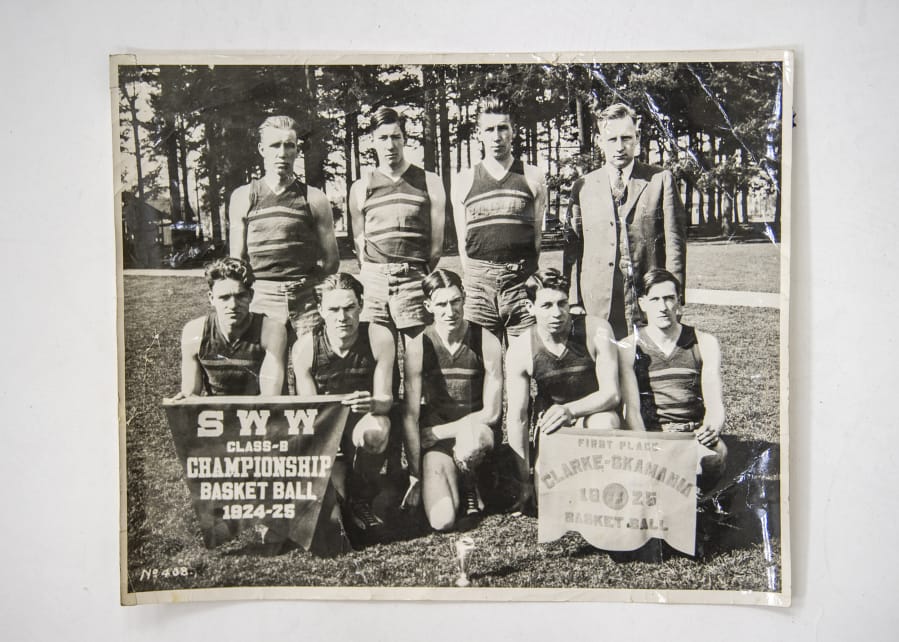“Which one of you youngins ain’t yet rungin’ the bell?”
Nobody knew M.P. Vanderpool’s booming voice better than residents of small-town Yacolt. He owned an industrial garage in the middle of logging country, ran for mayor twice, and orchestrated a rally to celebrate the eight boys who just made Yacolt proud at the Washington high school state basketball tournament.
Players took turns yanking the thick rope that rang the bell at the town’s only school. Their coach, Glen Hill, stood in the background. It was March of 1925.
Missing was Carl Olson, a quick-hustling guard with a unique shooting motion. He stood three blocks away purchasing lemon drops and a sucker at a town store. He was in no hurry for his bell-ringing glory.
“While daylight still shines!” Vanderpool shouted toward Olson. The teen heard the man one street away, shoved the candy in his pocket, and began to jog. “Your legs ain’t broke.”
The iron bell that hung in the belfry atop the eight-room, two-story school building rang for three reasons in the winter of 1925 — the end of the school day, when the boys basketball team won a game, and the day Vanderpool referred to the Yacolt High Loggers as the Great 8.
Yacolt High School no longer exists. But four years before the permanent closure, eight basketball players and one coach from a high school of 40 students placed third at the state tournament. It came during an era when all schools played for one trophy.
That year proved to be the beginning of trying times for the logging town. Mills closed, businesses locked up and the population spiraled. The high school closed in 1929.
But for one winter, one team showed what hard work meant, and gave its townspeople a reason to cheer and smile when the school bell rang.
Timber town
Today, Battle Ground Public Schools runs Yacolt Primary School, which serves more than 700 students in kindergarten through fourth grade. Nearly 100 years ago, Yacolt School District served 120 students in all grades in one building that opened in 1906.
Those were the days when jobs in the timber business was the backbone of the area economy. Weyerhaeuser Timber Co. employed close to 300 men and supplied most of the town’s population. Several small mills also surrounded the woods of northeast Clark County.
And Yacolt sports teams were made up of boys from hard-working families.
In 1924-25, the high school of 40 students had 19 boys, and eight of them showed up to play basketball. Most of the high school-age boys turned out for baseball that spring, but not enough turned out to have a football team.
A small loss turned into a big gain. That meant three months of basketball practices.
Charles Work and Carl Olson started nearly every game together for two seasons. Robert and Fred Huffman were reserves in basketball who starred as pitcher and catcher in baseball. Ernest and Charlie White lived in a small place in town together during the week to attend school, and traveled home to Amboy on the weekends. Charlie White joined teammate Marion Roper in one of the high school’s final graduating classes.
Few in the region, however, had the skill set of Clarence Grady, a broad-shouldered 6-foot-2 center who led the team in scoring, led the student council and starred in the one-act theatre production of “Levi Goes a Hunting.”
Yacolt won nine of its first 10 games by the time Clarke-Skamania League play began. The 10-team league featured two divisions and the Loggers played in Class B field with the Ridgefield Potato Diggers, La Center Bears, Vancouver High’s JV team, and the Battle Ground Cheesemakers. (Tiger was the official mascot, but a local dairy donated all athletic uniforms. Townspeople called the sports teams “Cheeses.”)
Yacolt’s small enrollment meant a unique home court advantage. The gymnasium behind the school wasn’t regulation size, didn’t have heat, and had several bullet holes from when townspeople fired guns at a flock of pigeons earlier that winter. The Columbian wrote in 1925 how Yacolt’s team might be “lost” on a larger floor.
That never fazed the Loggers. But their biggest challenge came in their home gym. A league protest fueled their fire to win, and set the tone for an improbable run to state.
Controversy with rival
Yacolt and La Center’s proximity and similar enrollment made the two schools rivals, but La Center might as well have been known as the league’s stepchild. It was the last local school to play basketball outdoors on dirt not much smoother than its roads.
La Center also had star forward Charley Woodward. League officials suspended Woodward midseason as they investigated claims two Ridgefield men paid Woodward to play on a semi-pro baseball team, and hence, losing amateur status. Yacolt’s only league loss came to La Center, 21-20, weeks earlier. All teams but La Center filed a protest.
“If the protest sticks,” coach Glen Hill said in 1925, “we want the La Center game forfeited by La Center or another game played. … We have no wish to force Woodward out of the league, and brand him as a professional, but we want an even break.”
Yacolt got its wish. Yacolt and La Center played a second game, this time for the division title. The league deemed Woodward eligible.
Yacolt’s biggest game of the season suddenly became the week’s biggest story. Close to 300 patrons showed up at Yacolt’s small gym. One Vancouver man even printed a classified ad to sell two miniature horses at the gym entrance.
“All offers off when the gun goes off,” it read.
Behind Clarence Grady’s 13 points, the Loggers won 28-14 to seal the division title. The crowd booed Woodward “loud and long.” He finished with two points and four fouls.
Days later, officials awarded Yacolt to represent the league at the district tournament over Class A division winner Washougal based on winning percentage.
Yacolt was the newbie at districts, but played like veterans over three games in Centralia. It won the district title by defeating Longview, Goldendale, and Ilwaco to earn a spot at state.
Dr. L.E. Hockett, a renowned physician in town, accompanied the team to districts. So did Vanderpool, the owner of the industrial garage. He offered free gasoline to entice residents who own vehicles to make the drive to support Yacolt.
Just before the drive home with a state berth locked and district title won, Dr. Hockett handed Hill a cigar.
As superintendent and principal, Hill wore a three-piece suit when he coached basketball and baseball. Respectful and courteous is what Hill expected from the students he taught, as well the players he coached.
“Light it up, sir. The taste of a winner,” the doctor said.
Hill politely held off, but put the cigar in his suit breast pocket.
More wins were ahead.
Yacolt on the map
By 1925, the state basketball tournament hit its third year. Famed University of Washington coach Clarence “Hec” Edmundson created the tournament as a way to draw future students to UW from all corners of the state.
Teams stayed at on-campus fraternity houses. Part of teams’ state tournament experience included campus tours. Big-city life in Seattle was vastly different from navigating through tree stumps on muddy roads to get out of Yacolt.
They played all four games in unwashed uniforms. Yacolt was the only Class B school to win its first two games, beating Auburn, 19-18, then Whatcom of Bellingham in overtime to meet North Yakima in the semifinals.
It got reporters like Walter Morrison of UW’s student-run newspaper curious. He found Yacolt’s team outside the gym after its quarterfinal game. It was Yacolt’s turn for a campus tour.
The student reporter hadn’t heard of Yacolt, much less could find it on a map. Years earlier and after the infamous Yacolt Burn of 1902, the Tacoma Times printed Yacolt town news as a form of entertainment.
Hill knew this. So when Morrison approached Hill, the coach happily answered all the reporter’s questions because Hill wanted Seattle to know about his team and town.
But first, Hill had a question for Morrison.
“Son,” the coach said, “got a map?”
Unravelling in semifinal
Yacolt’s winning streak hit 11 games by the time it faced North Yakima, and the two games at state came with heroic performances. Marion Roper scored six points in the quarterfinal on one shoe when the laces unraveled. Clarence Grady continued to dominate in spite of a bad hand from a farming accident midseason. Charles Work still had stitches on his right leg after playing through an infection at districts two weeks earlier.
But the Loggers were no match against the larger Class A team from a school of more than 600 students. Yakima (later renamed A.C. Davis) won 33-14 on its way to defeating Clarkston for the state title. Yacolt bounced back to beat Hoquiam hours later, 28-10, to place third.
Grady made the all-state team; his 47 points in four games ranked second in tournament scoring.
Yacolt’s basketball team won three league titles between 1915 and its final season in 1929. The town turned quieter after the Weyerhaeuser era, and by 1929, Yacolt High’s enrollment plummeted to 11 students in two grades. The State Board of Education revoked the high school’s accreditation. It closed in May of 1929, but continued to serve elementary students.
Hill later became the head of the Washington State Teachers Association, and left Yacolt in 1927. Two days after his 1925 basketball team returned from the state tournament is when Vanderpool organized the rally to celebrate the special feat accomplished by the eight boys and their coach.
Carl Olson was the final player to ring the school building’s iron bell to a rousing ovation. Right afterward, Hill lit the cigar the town physician handed him two weeks earlier.
“The taste of a winner,” the coach proclaimed.




